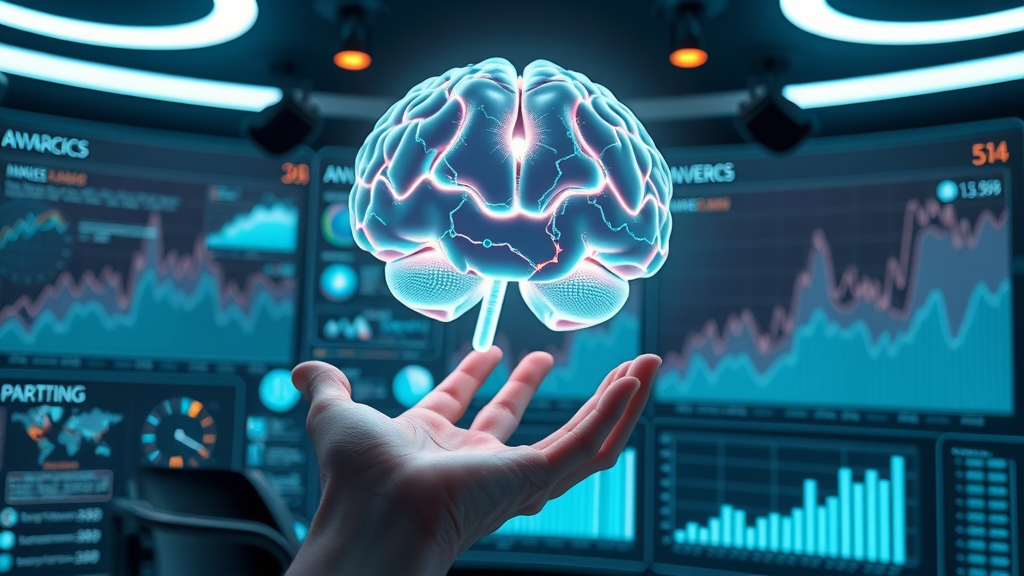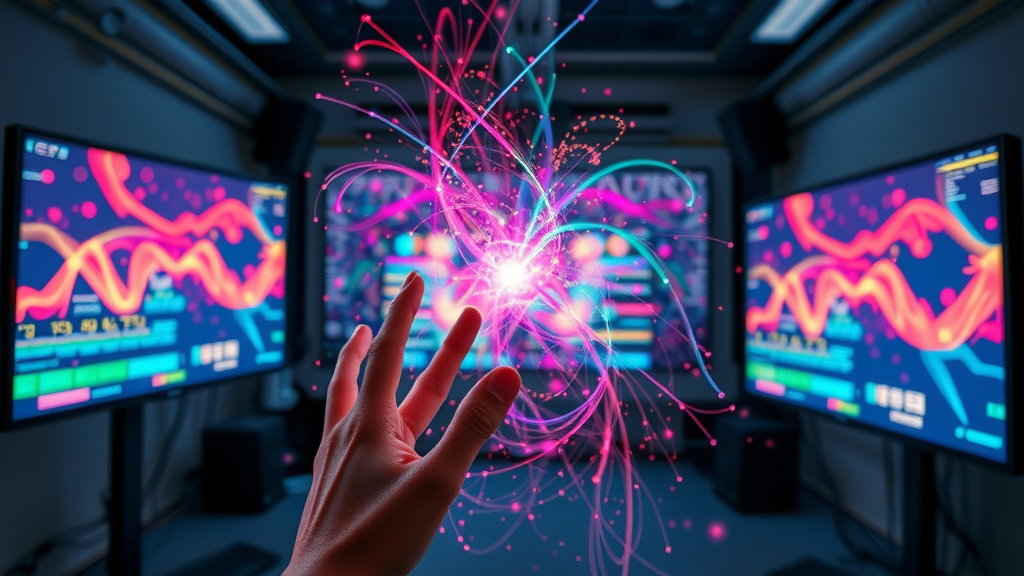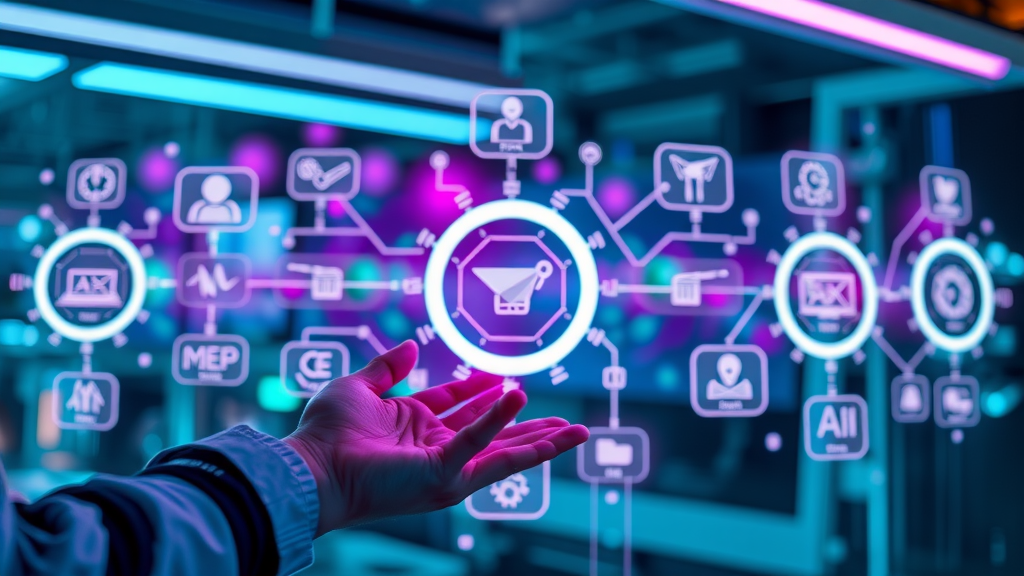Did you know that over 80% of marketing leaders already use some form of artificial intelligence in marketing? This startling statistic marks a seismic shift in how businesses attract, engage, and convert customers. Today, artificial intelligence in marketing is rewriting the rulebook, helping brands achieve record-breaking sales and customer loyalty through unprecedented automation, personalization, and growth strategies. In this guide, you’ll learn not only how AI is transforming marketing teams but also how you can leverage this evolution to gain a competitive advantage in the dynamic ai market.
Revealing the Unprecedented Impact: Artificial Intelligence in Marketing Today
- Did you know that over 80% of marketing leaders already use some form of artificial intelligence in marketing? This figure highlights an industry-wide adoption that is revolutionizing sales and customer engagement.

- This article guides you through the critical ways artificial intelligence in marketing sets new standards and unlocks innovative opportunities for marketing teams.
Artificial intelligence in marketing is more than a passing trend; it's a fundamental shift shaping how businesses engage with audiences, generate leads, and drive conversions. Using ai tools, predictive analytics, and generative ai, brands now streamline everything from content creation to marketing automation, ensuring more efficient marketing campaigns and a measurable impact on sales. As your marketing team navigates this evolving landscape, embracing AI is crucial not only to keep pace but to leap ahead of competitors in the ai market.
How Artificial Intelligence in Marketing is Reshaping the AI Market
Understanding the AI Market: Growth, Trends, and Influence of Artificial Intelligence
- AI market overview: Market size, projected growth, and the leading role of artificial intelligence in reshaping traditional marketing landscapes.
- Notable statistics on AI market adoption within global marketing teams.
The ai market has witnessed exponential growth, with experts projecting it will surpass $500 billion within this decade. Artificial intelligence in marketing stands at the forefront, offering solutions that allow companies to process vast amounts of customer data and translate insights into personalized customer experiences. Marketing teams leveraging ai marketing see clear improvements in identifying consumer behavior, optimizing campaigns, and harnessing generative ai for tailored content marketing. These shifts are driving a new era where marketing strategies depend on agile ai tools and robust data-driven decision-making.
Recent adoption rates of ai in marketing underscore its momentum: over 60% of global marketing teams use at least one ai tool daily, while nearly half plan to increase their AI budgets. AI-driven processes deliver advantages ranging from predictive analytics that anticipate trends to marketing automation that reduces campaign launch cycles. The ability to decode customer behavior and adjust strategies in real-time offers a sustainable competitive advantage for those embracing ai adoption early.
| Aspect | Traditional Marketing | Artificial Intelligence in Marketing |
|---|---|---|
| Data Analysis | Manual, time-consuming | AI-powered, real-time insights |
| Personalization | Generic, broad segments | Hyper-targeted, dynamic experiences |
| Time-to-Market | Slow, reliant on manual workflow | Rapid, enabled by automation and ai tools |
| ROI Measurement | Limited, post-campaign analysis | Continuous, data-driven optimization |
Key Concepts: What Artificial Intelligence in Marketing Means for Modern Brands
Artificial Intelligence: Redefining Marketing Foundations
- Defining artificial intelligence and its significance for ai marketing and marketing teams.
- Examples of ai tools and generative ai transforming content creation and marketing automation.
At its core, artificial intelligence in marketing refers to the deployment of smart algorithms and machine learning models to analyze customer data, automate repetitive tasks, and refine marketing strategies. AI marketing has moved beyond theory, with marketing teams using advanced ai tools every day for content creation, customer segmentation, and campaign optimization. By understanding consumer behavior from vast amounts of data, brands can deliver a personalized customer experience that traditional marketing could only dream of.

Examples of ai tools now abound, from generative ai applications that automatically create blog posts, social media content, and even video ads, to marketing automation software that triggers personalized messages based on real-time user actions. These innovations empower marketers to shift their focus from manual production to strategic decision-making, resulting in marketing campaigns that are not only more creative but drastically more efficient. As AI continues to evolve, so does the role of artificial intelligence in shaping every facet of marketing efforts, from ideation and execution to measurement and optimization.
What You'll Gain from Leveraging Artificial Intelligence in Marketing
- A comprehensive understanding of how artificial intelligence in marketing enhances efficiency and boosts sales success.
- Practical applications, predictive analytics, and how to deploy ai tools for measurable ROI.
- Top real-world case studies from leading global brands implementing ai marketing strategies.
- Key actionable steps for your marketing team to confidently embrace ai adoption.
Integrating artificial intelligence in marketing pays dividends for both efficiency and sales success. Modern marketing teams are empowered to process and act upon customer data in real-time, enabling predictive analytics to steer campaigns before issues arise. This transformative impact is already seen in companies like Coca-Cola and Netflix, where generative ai and predictive modeling have revolutionized customer engagement, campaign targeting, and ROI measurement. By incorporating best-in-class ai tools for content creation, automation, and analytics, your marketing team can unlock new opportunities, adapt to shifting consumer behavior, and future-proof your marketing strategies in a rapidly evolving ai market.
Learning how to deploy artificial intelligence doesn’t just give your business a technological edge – it cultivates a culture of continuous improvement and data-driven innovation. As you progress through this article, you’ll uncover actionable strategies, discover proven case studies, and find guidance to help every marketing team member seamlessly adapt and thrive in the new era of ai marketing.
Strategy First: AI Marketing, Predictive Analytics & Customer Data Excellence
Integrating Predictive Analytics for Personalized Experiences
- The importance of robust customer data for artificial intelligence in marketing.

- How predictive analytics turns big data into sharper marketing strategies for marketing teams.
- Step-by-step: Implementing AI-driven predictive models to boost conversion rates.
Robust customer data is the backbone of any successful artificial intelligence in marketing initiative. Quality data ensures that predictive analytics—one of the core strengths of marketing AI—can create accurate customer profiles, segment audiences, and deliver hyper-personalized marketing campaigns. For marketing teams, harnessing accurate customer data means every interaction can be customized to maximize engagement, build loyalty, and fuel exponential sales growth.
Predictive analytics leverages vast amounts of behavioral, social media, and transactional data to reveal patterns that guide marketing strategies. AI tools analyze these patterns to predict which prospects are likely to convert, when they are most receptive, and which messages will be most effective. By adopting predictive analytics models, teams can automate the targeting process, refine messaging, and dynamically allocate budget for the highest possible ROI.
To implement AI-driven predictive models, start by centralizing your customer data into a unified system. Next, select an ai tool designed for predictive analytics within marketing teams—many offer step-by-step setup and integration. Monitor KPIs such as conversion rates, average order value, and customer engagement to measure the tangible benefits and adjust your strategies for continuous improvement.
Generative AI and AI Tools Changing the Marketing Game
Leading AI Tools for Content Creation, Marketing Automation, and More
- Overview of the top generative ai tools reshaping content marketing and creative processes.
- How ai tools automate repetitive marketing tasks, saving time and unlocking creative bandwidth for marketing teams.
- Real examples of marketing automation driven by artificial intelligence in marketing workflows.

Generative ai tools have rapidly become essential for marketing teams striving to streamline content creation and campaign management. Leading platforms such as ChatGPT, Jasper, and Google’s content suggestion engines now produce blog posts, social media updates, and complex ad copy in minutes. With a few prompts, these ai tools can help ideate, draft, and personalize media posts at scale—liberating creative energy for strategic marketing efforts.
Automation is another major boon of artificial intelligence in marketing. AI-powered platforms like HubSpot and Marketo provide marketing automation capabilities that drastically cut the time required for campaign deployment, customer segmentation, and performance tracking. By automating repetitive tasks—such as scheduling social media posts, responding to customer inquiries, or launching personalized email sequences—marketing teams can focus on scaling impactful marketing campaigns rather than managing the minutiae.
Real-world use cases abound: brands are automating lead scoring, dynamically adjusting ad copy to user preferences, and delivering personalized recommendations at every stage of the customer journey. These marketing automation advances not only save time but also enhance campaign precision, ensuring relevancy and increasing sales conversions across channels.
Building a Data-Driven Marketing Team: AI Adoption & Culture
Steps for Ensuring Successful AI Adoption for Marketing Teams
- Training strategies for marketing teams to master artificial intelligence in marketing applications.
- Fostering a culture of AI adoption: Overcoming resistance and promoting continuous learning.
AI is not just a tool, it's a mindset transformation for successful marketing teams.
- Case study: A global brand’s journey towards full-scale ai adoption and its effect on sales.
Successful ai adoption requires a blend of the right ai tools, robust training, and company-wide support. Start with workshops and ongoing education so your marketing team understands both the capabilities and ethical considerations of artificial intelligence in marketing. Empower staff to experiment with ai tools for content marketing, predictive analytics, and marketing automation, and provide sandbox environments to encourage creative exploration.
Cultivating a culture that supports innovation is vital. Address resistance by highlighting concrete results: showcase how ai tools enable more meaningful customer interaction, streamline marketing efforts, and deliver measurable ROI. Regularly track and share performance improvements attributable to ai market investments, and foster an environment where every team member can propose and test new applications for AI in marketing.
A compelling case study is Unilever’s global adoption of AI-powered data analytics. By upskilling its marketing teams and adopting a growth mindset, Unilever improved campaign targeting and reduced time-to-market. The result? Substantial sales growth and a brand reputation now synonymous with marketing ai excellence. Your own marketing team’s journey can mirror this success, provided there’s a clear commitment to continuous learning and iterative ai adoption.
Content Marketing Reimagined: Role of Artificial Intelligence in Marketing
Smart Content Creation and Delivery via AI Tools
- How artificial intelligence in marketing is used for hyper-personalized content creation.
- Generative ai for rapid content ideation and campaigns.
- Utilizing marketing automation to streamline content distribution and maximize audience impact.

Artificial intelligence in marketing has transformed content marketing by enabling hyper-personalized content creation . Generative ai platforms analyze customer data, preferences, and online behavior to tailor messaging to specific audience segments, resulting in higher engagement and conversion rates. This personalization goes beyond names in emails—it includes relevance in content, timing, and delivery across multiple channels, strengthening customer relationships and loyalty.
Rapid content ideation and campaign deployment are no longer bottlenecks thanks to generative ai. Content marketers can now generate topic ideas, outlines, and even initial drafts that align with identified trends and keyword opportunities, ensuring timely and relevant messaging. Marketing automation further amplifies this effect by automating content distribution—delivering the right message, on the right channel, at precisely the right time to maximize audience impact and ROI.
Adopting AI for content delivery also means more insightful performance tracking. Machine learning models monitor customer interaction, adapt messaging in real time, and suggest improvements for future campaigns. The result: More effective content marketing strategies and a sharper focus on delivering exceptional customer experiences, underpinned by the power of artificial intelligence.
- Watch a visual walkthrough of generative ai and ai tools in action for marketing teams.
- Insights from industry leaders on ai marketing, marketing strategies, and customer engagement.
- How predictive analytics, ai tools, and marketing automation converge for exponential growth.
People Also Ask: How is AI Used in Marketing?
- AI is leveraged in marketing to analyze customer data, segment audiences, personalize recommendations, automate communications, generate creative content using generative ai, and drive predictive analytics. These ai marketing strategies significantly enhance efficiency, targeting, and conversion rates.
People Also Ask: What is the Best Example of AI in Marketing?
- One standout example of artificial intelligence in marketing is Netflix’s recommendation engine, which uses predictive analytics and customer data to suggest content, engaging users and increasing retention through highly personalized experiences.

People Also Ask: How Does Coca-Cola Use AI in Marketing?
- Coca-Cola utilizes artificial intelligence in marketing to analyze consumer behavior, deploy targeted ad campaigns, and experiment with generative ai for innovative content creation. These techniques help maintain its leadership in the competitive ai market.
People Also Ask: How is AI Used in Content Marketing?
- Artificial intelligence in marketing empowers content marketing by automating content creation, curating personalized messaging, enabling predictive topic analysis, and enhancing marketing automation for consistent and impactful distribution.
Top Marketing Strategies Enabled by Artificial Intelligence in Marketing
- Personalized marketing at scale leveraging customer data.
- Predictive analytics for smarter campaign planning.
- Utilizing ai tools for real-time engagement.
- Refined segmentation and targeted messaging with generative ai.
- Streamlining content creation and marketing automation processes.

Comparative Table: Traditional vs Artificial Intelligence in Marketing Approaches
| Process | Traditional Approach | AI-Driven Approach |
|---|---|---|
| Content Creation | Manual writing, slow iterations | Automated, AI-generated content in real time |
| Audience Segmentation | Basic demographics | AI-enabled micro-segmentation based on behavior |
| Campaign Launch | Scheduled, labor-intensive | Immediate, automated, triggered by user actions |
| ROI Analysis | Retroactive, limited insights | Continuous optimization, predictive analytics |
Facts and Figures: The Measurable Impact of Artificial Intelligence in Marketing
- AI-powered campaigns can increase conversion rates by up to 50%.
- Over 60% of marketing teams see reduced operational costs after ai adoption.
- Generative ai reduces content production time by 30% or more.
Leading Generative AI Applications for Content, Analytics, and Automation
- AI-powered chatbots for 24/7 customer support.
- Generative AI for blog, video, and ad content creation.
- AI tools for deep analytics and real-time campaign optimization.

Challenges and Limitations of Artificial Intelligence in Marketing
- Dependence on quality customer data.
- Integration with legacy systems.
- Ethical concerns regarding personalization and privacy.
- The skills gap within marketing teams regarding ai tools.
Essential Steps for Successful Artificial Intelligence in Marketing Rollout
- Audit existing marketing strategies and customer data infrastructure.
- Select the right ai tools for specific needs (content marketing, automation, analytics).
- Invest in ongoing ai adoption training for marketing teams.
- Monitor KPIs and continually refine AI-driven tactics.
Quotable Insights on Artificial Intelligence in Marketing
"If your marketing team isn’t already leveraging artificial intelligence, you risk falling behind in the ai market race." – Industry Expert
Frequently Asked Questions on Artificial Intelligence in Marketing
- How quickly can ai marketing improve ROI for marketing teams? Many organizations see improvements in ROI from ai marketing within just a few months of implementation. As AI-driven processes streamline workflows and enhance campaign targeting, marketing teams typically notice significant boosts in conversion rates and operational efficiency by the end of the first quarter post-adoption.
- Which ai tools offer the most value for marketing teams with limited resources? For marketing teams on tight budgets, cloud-based platforms like HubSpot, Jasper, and Canva offer robust generative ai features for content creation, marketing automation, and analytics at accessible pricing. These solutions provide quick onboarding, automated workflows, and scalable results.
- What safeguards should be implemented to address data privacy? When deploying artificial intelligence in marketing, always adhere to data protection regulations such as GDPR and CCPA. Implement encryption, user consent protocols, and regular audits of data usage to ensure customer data privacy and ethical marketing practices.
- How does generative ai future-proof content marketing efforts? Generative ai ensures ongoing adaptability in content marketing by automating topic discovery, trend analysis, and message personalization. As consumer behavior shifts, generative ai tools can rapidly pivot strategies and maintain campaign relevance—future-proofing your content marketing efforts.
Final Thoughts: Preparing Your Marketing Team for the Next Era with Artificial Intelligence in Marketing
- Equipped with the latest insights on artificial intelligence in marketing, your marketing team can harness ai tools, generative ai, and marketing automation to not only keep pace but to leap ahead in the evolving ai market. Take action by exploring new solutions, investing in training, and rethinking your marketing strategies for sustainable growth and customer-centric innovation.
Artificial intelligence (AI) is revolutionizing marketing by enabling businesses to analyze vast amounts of data, personalize customer experiences, and automate various processes. For instance, AI-driven predictive analytics allow marketers to anticipate customer behaviors and tailor campaigns accordingly, leading to improved engagement and conversion rates. ( ibm.com ) Additionally, AI-powered chatbots enhance customer service by providing instant, personalized responses, thereby increasing customer satisfaction and loyalty. ( marketingevolution.com ) By integrating AI into their strategies, companies can achieve greater efficiency, cost savings, and a competitive edge in the dynamic marketing landscape.
 Add Row
Add Row  Add
Add 




Write A Comment